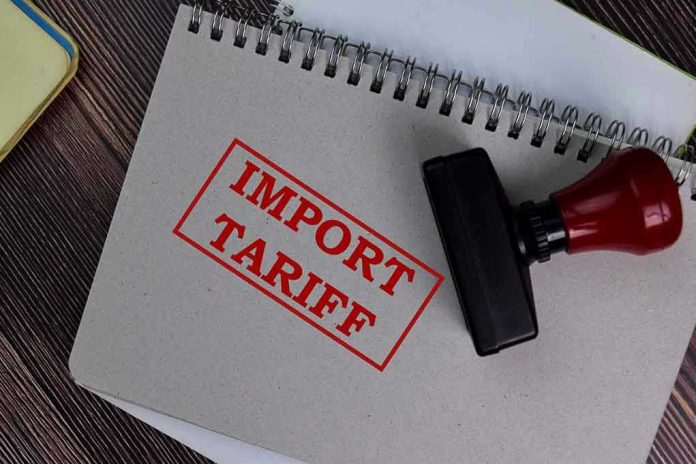
Mexico’s abrupt suspension of all package shipments to the United States exposes the far-reaching consequences of President Trump’s push to close trade loopholes, triggering confusion and disruption for small businesses and consumers.
Story Snapshot
- Mexico’s national postal service halted all mail and parcel shipments to the U.S., citing new tariff requirements under Trump’s executive order.
- The de minimis exemption, which allowed duty-free imports under $800, ended for all countries—impacting e-commerce and small business exports.
- Several nations have joined Mexico in suspending shipments, amplifying global disruption and uncertainty in cross-border trade.
- U.S. officials frame the policy as targeting tariff evasion and drug trafficking, but critics warn of broader economic fallout and strained diplomatic ties.
Trump Administration Ends De Minimis Exemption, Prompting Global Shipping Suspensions
On July 30, 2025, President Trump signed an executive order that immediately revoked the de minimis exemption for all inbound international packages, eliminating the long-standing rule that allowed shipments valued at $800 or less to enter the U.S. duty-free. This aggressive policy shift was intended to tighten trade enforcement, curb tariff evasion, and address national security concerns. In direct response, Mexico’s Correos de México announced on August 27 that it would temporarily halt all postal and parcel shipments to the United States. The unprecedented move mirrored actions by several other countries and sent shockwaves through the global e-commerce sector.
The de minimis exemption had underpinned thriving cross-border e-commerce, benefiting both American consumers and small businesses abroad. In 2024 alone, 1.36 billion packages worth $64.6 billion entered the U.S. under this rule, with Mexico among the leading sources. By ending the exemption, the Trump administration aimed to close what it described as a loophole for illicit goods and tariff evasion. However, the sudden change left postal authorities and exporters scrambling to adjust, as new procedures for collecting and remitting duties on low-value shipments remained undefined. Mexico’s suspension is set to persist until clear operational guidelines are established, a position echoed by other affected nations.
Broader International Fallout and Industry Disruption
Mexico’s suspension is part of a wider international reaction, with countries such as Australia, Britain, Germany, South Korea, and Japan also pausing shipments to the U.S. The ripple effect is felt by small businesses and e-commerce platforms, which now face higher costs, longer delays, and uncertainty in fulfilling orders. U.S. consumers experience reduced access to affordable foreign goods, particularly niche and specialty products often sourced from overseas sellers. The move intensifies strain in diplomatic relations and complicates ongoing trade negotiations, as foreign governments seek clarity and certainty for their exporters and postal operators.
Industry experts warn that the abrupt end of the de minimis exemption and resulting shipping suspensions risk destabilizing global supply chains and e-commerce markets. Small businesses, which lack the resources and compliance infrastructure of larger firms, are disproportionately affected. E-commerce giants like Amazon and Mercado Libre must contend with diminished product variety and increased supply chain complexity. The economic impact is significant: exporters lose revenue, consumers face price hikes, and postal services grapple with operational uncertainty. Long-term, the policy could reshape the landscape of international shipping and further concentrate market power among large corporations capable of absorbing new regulatory costs.
Security Rationale Versus Economic and Social Costs
U.S. officials have justified the policy as a necessary measure to combat tariff evasion and the infiltration of illicit drugs through small parcels. Supporters argue that tighter controls protect American interests and strengthen border security. However, trade analysts and consumer advocates caution that the broad scope of the policy imposes undue burdens on legitimate commerce and everyday consumers. While the stated aim is to close loopholes exploited by bad actors, the immediate effect is widespread disruption for law-abiding businesses and families. The lack of a clear timeline for resuming normal postal operations further compounds anxiety for affected communities and industry stakeholders.
Mexico suspends package shipments to US ahead of Trump tariff deadline https://t.co/zvqyWf83al
— FOX Business (@FoxBusiness) August 28, 2025
Diplomatic efforts are ongoing, with Mexico’s Ministry of Foreign Affairs and international postal organizations negotiating with U.S. authorities to develop workable customs procedures. Until operational clarity is achieved, the suspension will continue, leaving businesses and consumers in limbo. The Trump administration’s approach reflects a broader trend toward aggressive trade enforcement and skepticism of globalism—values that resonate with many conservatives. Yet, the fallout raises fundamental questions about the balance between security interests and the economic vitality of American families and small businesses.
Sources:
Mexico postal shipments to US halted amid tariff confusion (ColoradoBiz/AP)
Mexican mail suspends package delivery to US as new tariffs take hold (Mexico News Daily)







